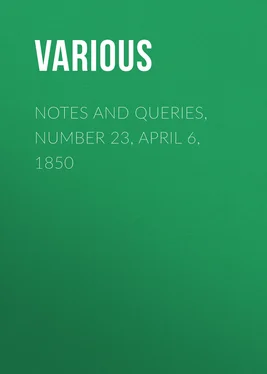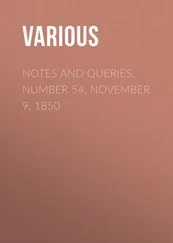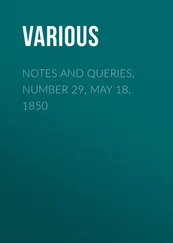Various - Notes and Queries, Number 23, April 6, 1850
Здесь есть возможность читать онлайн «Various - Notes and Queries, Number 23, April 6, 1850» — ознакомительный отрывок электронной книги совершенно бесплатно, а после прочтения отрывка купить полную версию. В некоторых случаях можно слушать аудио, скачать через торрент в формате fb2 и присутствует краткое содержание. Жанр: foreign_antique, periodic, foreign_edu, на английском языке. Описание произведения, (предисловие) а так же отзывы посетителей доступны на портале библиотеки ЛибКат.
- Название:Notes and Queries, Number 23, April 6, 1850
- Автор:
- Жанр:
- Год:неизвестен
- ISBN:нет данных
- Рейтинг книги:5 / 5. Голосов: 1
-
Избранное:Добавить в избранное
- Отзывы:
-
Ваша оценка:
- 100
- 1
- 2
- 3
- 4
- 5
Notes and Queries, Number 23, April 6, 1850: краткое содержание, описание и аннотация
Предлагаем к чтению аннотацию, описание, краткое содержание или предисловие (зависит от того, что написал сам автор книги «Notes and Queries, Number 23, April 6, 1850»). Если вы не нашли необходимую информацию о книге — напишите в комментариях, мы постараемся отыскать её.
Notes and Queries, Number 23, April 6, 1850 — читать онлайн ознакомительный отрывок
Ниже представлен текст книги, разбитый по страницам. Система сохранения места последней прочитанной страницы, позволяет с удобством читать онлайн бесплатно книгу «Notes and Queries, Number 23, April 6, 1850», без необходимости каждый раз заново искать на чём Вы остановились. Поставьте закладку, и сможете в любой момент перейти на страницу, на которой закончили чтение.
Интервал:
Закладка:
Various
Notes and Queries, Number 23, April 6, 1850
NOTES
PERIPLUS OF HANNO THE CARTHAGINIAN
I am not sufficiently Quixotic to attempt a defence of the Carthaginians on the western coast of Africa, or any where else, but I submit that the accusation brought against them by Mr. S. Bannister, formerly Attorney-General of New South Wales, is not sustained by the only record we possess of Hanno's colonising expedition. That gentleman, in his learned Records of British Enterprise beyond Sea , just published, says, in a note, p. xlvii.:—
"The first nomade tribe they reached was friendly, and furnished Hanno with interpreters . At length they discovered a nation whose language was unknown to the interpreters . These strangers they attempted to seize; and, upon their resistance, they took three of the women, whom they put to death, and carried their skins to Carthage" ( Geogr. Græci Minores , Paris, 1826, p. 115.).
Hanno obtained interpreters from a people who dwelt on the banks of a large river, called the Lixus, and supposed to be the modern St. Cyprian. Having sailed thence for several days, and touched at different places, planting a colony in one of them, he came to a mountainous country inhabited by savages, who wore skins of wild beasts, δερματα θηρεια ενημμενων. At a distance of twelve days' sail he came to some Ethiopians, who could not endure the Carthaginians, and who spoke unintelligibly even to the Lixite interpreters. These are the people whose women, Mr. Bannister says, they killed. Hanno sailed from this inhospitable coast fifteen days, and came to a gulf which he calls Νοτου Κερα, or South Horn.
"Here," says the Dr. Hawkesworth, of Carthage, "in the gulf, was an island, like the former, containing a lake, and in this another island, full of wild men; but the women were much more numerous, with hairy bodies (δασειαι τοισ σωμασιν), whom the interpreters called γοριλλασ. We pursued the men, who, flying to precipices, defended themselves with stones, and could not be taken. Three women, who bit and scratched their leaders, would not follow them. Having killed them, we brought their skins to Carthage."
He does not so much as intimate that the creatures who so defended themselves with stones, or those whose bodies were covered with hair, spoke any language. Nothing but the words ανθρωποι αγριοι and γυναικεσ can lead us to believe that they were human beings at all; while the description of the behaviour of the men, and the bodies of the women, is not repugnant to the supposition that they were large apes, baboons, or orang-outangs, common to this part of Africa. At all events, the voyagers do not say that they flayed a people having the faculty of speech.
It is not, however, improbable that the Carthaginians were severe taskmasters of the people whom they subdued. Such I understand those to have been who opened the British tin mines, and who, according to Diodorus Siculus, excessively overworked the wretches who toiled for them, "wasting their bodies underground, and dying, many a one, through extremity of suffering, while others perished under the lashes of the overseer." ( Bibl. Hist. l. v. c. 38.)
R.T. Hampson.POPE VINDICATED
"P.C.S.S." is too great an admirer of Pope not to seek to vindicate him from one, at least, of the blunders attributed to him by Mr. D. Stevens, at p. 331. of the "Notes and Queries."
"Singed are his brows , the scorching lids grow black."
Now, if Mr. S. will refer to Homer, he will find that the original fully justifies the use of "brows" and "lids" in the plural . It runs thus ( Od. ix. v. 389.):
"Παντα δε υι βλεφαρ αμφι και οφρυασ ευσεν αυτμη."
"P.C.S.S." wishes that he could equally remove from Pope the charge of inaccuracy respecting the three cannibal meals of Polyphemus. He fears that nothing can be alleged to impugn Mr. Stevens's perfectly just criticism.
While on the subject of Pope, "P.C.S.S." would wish to advert to a communication (No. 16. p. 246.) in which it is insinuated that Pope was probably indebted to Petronius Arbiter for the well-known passage—
"Worth makes the man, and want of it the fellow;
The rest is all but leather and prunella."
With all respect for the ingenious author of that communication, "P.C.S.S." confesses that he is unable to discover such a similitude of expression as might warrant the notion that Pope had been a borrower from Petronius. He cannot suppose that Mr. F. could have been led away by any supposed analogy between corium and coricillum . The latter, Mr. F. must know, is nothing more than a diminutive of a diminutive (coricillum, not corcillum, from corculum); and the word is coined by Petronius to ridicule one of the affectations of Trimalchio (Nero), who was wont to indulge, to an absurd extent, in the use of such diminutives ( vide Burmann, in loco ). "P.C.S.S." will now subjoin such translations of the passage in question as he has hitherto had opportunities of referring to. The first is from The Works of Petronius Arbiter, translated by several hands , Lond. 8vo. 4th edit. 1714. At the beginning of the translation itself there is this heading—"Made English by Mr. Wilson, of the Middle Temple, and several others." The passage in question is thus rendered:—
"Come, my friends, let us see how merry you can be! for in my time, I have been no better than yourselves; but, by my own industry, I am what I am. 'Tis the heart makes the man ; all the rest is but stuff!"
In another translation, which, with Grub-Street audacity, the publisher, in his title-passage, presumes to attribute to Addison! and which appeared in 1736 (Lond. 8vo.), the passage is as follows:—
"I was once as you are: but now, thanks to my industry, I am what I am. It is the heart that makes the man ; all the rest is but stuff!"
Be the translator who he may, this version, so impudently ascribed to the moral Addison, is written with much spirit and power, and with a remarkable comprehension of the author's meaning. Some of the poetical fragments at the end are, indeed, singularly well done.
Of the two French versions which "P.C.S.S." has examined, the one by Levaur (Paris, 8vo. 1726) thus translates the passage:
"Je vous prie, mes amis … C'est le coeur qui fait les hommes; je compte le reste pour un fétu ."
In that of Boispreaux (Lond. 1742), it is simply rendered—
"Mon sçavoir faire m'a tiré du pair. C'est le coeur qui fait l'homme …"
No attempt is made to translate the quisquilia .
P.C.S.S."THE SUPPER OF THE LORDE."
I shall be glad to find that your correspondent "C.H." (No. 21. p. 333.) receives a satisfactory answer to his inquiry, as such a reply would also satisfy my earlier query, No. 7. p. 109. I perceive, however, from his letter, that I can give him some information on other points noticed in it, though the absence of papers now passing through the press with the Parker Society's reprint of a third volume of Tyndale, will prevent my replying with such precision as I could wish. That ancient tract on "The Supper of the Lorde, after the true meanyng of the sixte of John," &c., of which "C.H." says he possesses a copy, was reprinted at different intervals with the same date, viz., MCCCCCXXXIII, Apryll v., on its title-page. The original edition has a final colophon, stating that it was "imprinted at Nornberg, by Nielas Twonson," and is so rare, that I have not been able to discover the existence of any copy, but one recently deposited in the Bodleian.
Читать дальшеИнтервал:
Закладка:
Похожие книги на «Notes and Queries, Number 23, April 6, 1850»
Представляем Вашему вниманию похожие книги на «Notes and Queries, Number 23, April 6, 1850» списком для выбора. Мы отобрали схожую по названию и смыслу литературу в надежде предоставить читателям больше вариантов отыскать новые, интересные, ещё непрочитанные произведения.
Обсуждение, отзывы о книге «Notes and Queries, Number 23, April 6, 1850» и просто собственные мнения читателей. Оставьте ваши комментарии, напишите, что Вы думаете о произведении, его смысле или главных героях. Укажите что конкретно понравилось, а что нет, и почему Вы так считаете.












